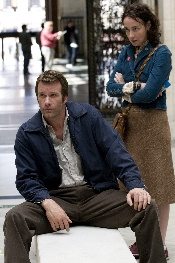
HBO
Yesterday HBO announced that Hung, its dark comedy about a suburban Michigan gigolo and his pimp, will get a third season. I’m pleased and surprised. I don’t think the show has lived up to its potential, but when it’s on—and the past couple of episodes have been strong—it’s an insightful look at people trying to hold on to their lives amid a cratering economy. But I seem to be an exception among critics, so without wall-to-wall raves I didn’t expect the show to get a third season, given its modest-at-best ratings.
After I posted the news on Twitter yesterday afternoon, I saw a lot of responses to the effect of: “How can HBO leave this on the air when they cancelled [your favorite show here]?” The short answer is that, whereas old-school TV networks decided shows’ fates more or less straight on the basis of ratings, the calculus of a pay-cable network is much more complicated.
First, there’s the question of relative cost. This is true everywhere, which is why reality shows have to clear a much lower ratings bar to stay on the air. But it’s far more true at HBO, where shows can range from relatively low-budget to Croesus-beggaring spectacles whose budgets rival major movies. Rome made it two seasons, but its elaborate sets and costs (guesstimated around $10 million per episode) made it too prohibitive to keep, even as a BBC coproduction. Carnivale had a high bar to clear as well. (Deadwood was another, more complicated story—David Milch moved on to John from Cincinnati—but it wasn’t cheap either.) Hung most likely is orders of magnitude less expensive.
But more important, pay cable networks don’t look at ratings the way anyone else does. They care, but in an indicative, not an absolute sense. They aren’t selling ads against their programming. What matters is not how many people watch any show, but how many people subscribe to their network (not to mention buy DVDs and other ancillary products).
That number is related to a show’s ratings, but not directly. People who get HBO or Showtime generally do for a complex of reasons: for this series and that one and that event, as well as, maybe, for the hope of some future programming to come. What matters is not so much if you are one of the millions who watch True Blood. What matters is if you got HBO because of True Blood, or would drop it without. (Nor is it usually that cut-and-dried; more likely, you keep HBO if you do because of the sense you’ve gradually gained over time that you will like its shows—the HBO aura, if you will.)
So HBO serves audiences and subaudiences, and shows are valuable not in terms of their absolute number of viewers but in terms of how many viewers they keep subscribing to HBO—a number that is, at best, guessable. In his days at HBO, Chris Albrecht once mentioned that the network kept Arli$$—the sports-agent comedy, modestly rated and reviled by critics—because there were enough HBO subscribers who got the channel for Arli$$ and nothing else. Which makes since, ironically, because Arli$$ was so less critically regarded than anything else on HBO; it meant the show was sufficiently different to draw a different audience.
I wouldn’t have guessed that Hung drew enough of a unique audience to keep it around, but that may be the case; or, at least, the combination of unique appeal + cost + factors unknown = keeping Hung is worth it. Which is appropriate enough for a show like Hung, which is about surviving by cobbling together whatever you’ve go.


